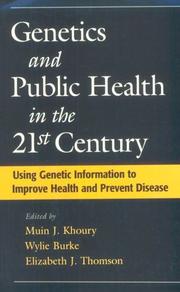| Listing 1 - 5 of 5 |
Sort by
|

ISBN: 0824719999 Year: 2000 Publisher: New York, NY : ©2000 Marcel Dekker,
Abstract | Keywords | Export | Availability | Bookmark
 Loading...
Loading...Choose an application
- Reference Manager
- EndNote
- RefWorks (Direct export to RefWorks)
Human cytogenetics. --- Medical genetics. --- Cytogenetics --- Chromosome Abnormalities --- Genetic Predisposition to Disease --- Genetic Techniques. --- Neoplasms --- methods. --- diagnosis.

ISBN: 0880119756 9780880119757 Year: 2000 Publisher: Champaign Human Kinetics
Abstract | Keywords | Export | Availability | Bookmark
 Loading...
Loading...Choose an application
- Reference Manager
- EndNote
- RefWorks (Direct export to RefWorks)
Perceptual-Motor Behavior in Down Syndrome is a comprehensive collection of contemporary research and provides readers a window into the behavioral variability exhibited by this special group. Now you can apply this research to circumvent, or at least minimize, some of the general and specific processing challenges associated with Down syndrome. Internationally recognized contributors from 10 different countries cover aspects of sensory, cognitive, and movement processes in infants, children, and adults with Down syndrome. Specifically addressed are the differences and similarities among persons with Down syndrome, people with other disabilities, and non-disabled people. Contributors present fellow researchers, educators, parents, and students with an increased understanding that perceptual-motor behavior in Down syndrome is often adaptive and appropriate. Use this up-to-date resource in current program planning, educational initiatives, and future research efforts. (Bron: covertekst)
Down syndrome. --- Perceptual-motor processes --- Perception --- Down Syndrome --- Down, Syndrome de --- Processus perceptivomoteurs --- Perceptual-motor processes. --- 032444.jpg --- Down-syndroom --- Mongolen: motoriek --- Down syndrome --- Sensory-motor processes --- Movement, Psychology of --- 21 trisomy --- Down's syndrome --- Mongolism --- Mongolism (Disease) --- Trisomy 21 --- Human chromosome abnormalities --- Intellectual disability --- Syndromes --- Human chromosome 21 --- Perception. --- Down Syndrome.

ISBN: 1134595883 1280401508 0203137892 0203171926 9780203171929 9780203137895 0415222826 9780415222822 0203179889 9780203179888 9781280401503 9786610401505 6610401500 9781134595884 9781134595839 1134595832 9781134595877 1134595875 9781138175150 1138175153 Year: 2000 Publisher: London New York RoutledgeFalmer
Abstract | Keywords | Export | Availability | Bookmark
 Loading...
Loading...Choose an application
- Reference Manager
- EndNote
- RefWorks (Direct export to RefWorks)
Working with Hannah is a unique and detailed snapshot of the first years of schooling for a child with Down's Syndrome and severe mobility and communication problems. Written by two classroom assistants, who supported Hannah during her two and a half years in a mainstream infant school, this book shows how the right level of support can make inclusion a success not only for the child and family but also for the school itself. This practical guide describes the 'hands on' approach of Hannah's day-to-day management in a busy school. Topics covered include:*finding a school*how t
Children with Down syndrome --- Mainstreaming in education --- Inclusive education --- Inclusion (Education) --- Inclusive learning --- Inclusive schools movement --- Least restrictive environment --- Education --- Developmentally disabled children --- Education (Early childhood) --- Children with mental disabilities --- Down syndrome --- 21 trisomy --- Down's syndrome --- Mongolism --- Mongolism (Disease) --- Trisomy 21 --- Human chromosome abnormalities --- Intellectual disability --- Syndromes --- Human chromosome 21 --- Mentally handicapped children --- Mentally retarded children --- Retarded children --- Children with disabilities --- Youth with mental disabilities

ISBN: 0262140438 0262315971 9780262315975 9780262140430 Year: 2000 Publisher: Cambridge : MIT Press,
Abstract | Keywords | Export | Availability | Bookmark
 Loading...
Loading...Choose an application
- Reference Manager
- EndNote
- RefWorks (Direct export to RefWorks)
This book covers recent research with neurobiological and cognitive features of Down syndrome. This book covers recent research with neurobiological and cognitive features of Down syndrome. There has been notable progress in understanding the psychobiological concomitants of Down syndrome. New data have pinpointed selective neurological defects, and recent research has revealed that it is possible to work with the supposedly intractable, irreversible deficits accompanying Down syndrome. Surprising improvements in cognitive functions, including language, can be shown by children and even adolescents. The topics include: early concept learning in infants with Down syndrome (Jennifer Wishart); the emergence of language skills (Lars Smith), early lexical development (Caroline Mervis), and developmental asynchrony of language development in Down syndrome (Jon Miller); the use of computers with speech output to promote language use (Laura Meyers); differences between Down syndrome and normally developing children in the use of a number concept (Rochel Gelman); the neuropsychological status of older Down syndrome individuals (Krystyna Wisniewski); neuropathological (Thomas Kemper), psychobiological (Siegfried Peuschel), and neurophysiological (Eric Courchesne) aspects of Down syndrome; and the relation between Down syndrome and Alzheimer's disease (Michael Thase). The Psychobiology of Down Syndrome is included in the series Issues in the Biology of Language and Cognition, edited by John C. Marshall, and is sponsored by the National Down Syndrome Society. A Bradford Book.
Psychobiology --- -Down syndrome --- -Congresses --- Congresses --- Patients --- -Language --- -Longitudinal studies --- -21 trisomy --- Down's syndrome --- Mongolism --- Mongolism (Disease) --- Trisomy 21 --- Human chromosome abnormalities --- Mental retardation --- Syndromes --- Human chromosome 21 --- Biological psychology --- Biopsychology --- Biology --- Human behavior --- Psychology --- Biological psychiatry --- Down syndrome --- Longitudinal studies --- Language --- Down Syndrome --- Language development --- Down, Syndrome de --- Mongoliens --- Psychobiologie --- psychology --- congresses. --- Congresses. --- Congrès --- Langage --- Etudes longitudinales --- Language Development --- 21 trisomy --- Intellectual disability --- Patients&delete& --- Language&delete& --- Longitudinal studies&delete& --- Down syndrome - Congresses --- Down syndrome - Patients - Longitudinal studies - Congresses --- Psychobiology - Congresses --- Down syndrome - Patients - Language - Congresses --- COGNITIVE SCIENCES/General --- BIOMEDICAL SCIENCES/General

ISBN: 0195128303 Year: 2000 Publisher: Oxford Oxford university press
Abstract | Keywords | Export | Availability | Bookmark
 Loading...
Loading...Choose an application
- Reference Manager
- EndNote
- RefWorks (Direct export to RefWorks)
It provides a comprehensive review of public health genetics, including chapters on important general issues such as newborn and other genetic screening, the delivery of genetic services, and the ethical, legal and social implications of the use of genetics within public health. It also reviews relevant clinical topics, the historical background, cross-cultural aspects, and communication issues. Contributors come from a wide range of fields including epidemiology, biostatistics, health policy and management, health services research, behavioral and social sciences, ethics, law, health economics, and laboratory sciences. The first broad survey of the role of genetics in public health, with emphasis on the new molecular genetics. With the accelerating discovery of human genes, public health professionals are increasingly confronted with a large body of scientific information that will guide public health action. Because the broad mission of public health is to fulfill society's interest in assuring conditions in which people can be healthy, the integration of new genetic information in public health research, policy and program development is unavoidable. Public health leadership is urgently needed to use genetic information to improve health and prevent disease, and to address ethical, legal and social issues resulting from inappropriate use of such information. In the not too-distant future, disease prevention and health promotion programs will routinely consider whether or not to use genetic information to help target behavioral, medical or environmental intervention activities in order to maximize benefit and minimize costs and harm to individuals. In anticipation of the expected growth at the interface of genetics and public health, this book delineates a framework for the integration of advances in human genetics into public health practice.
Genetic screening --- Medical genetics --- Public health --- #GBIB:CBMER --- moleculaire genetica --- volksgezondheid --- menselijk genoom --- genetische counseling --- Community health --- Health services --- Hygiene, Public --- Hygiene, Social --- Public health services --- Public hygiene --- Sanitary affairs --- Social hygiene --- Health --- Human services --- Biosecurity --- Health literacy --- Medicine, Preventive --- National health services --- Sanitation --- Clinical genetics --- Diseases --- Heredity of disease --- Human genetics --- Medical sciences --- Pathology --- Genetic disorders --- Human chromosome abnormalities --- Medical screening --- génétique moléculaire --- santé publique --- génome humain --- conseil génétique --- Genetic aspects --- Diagnosis --- Genetic screening. --- Medical genetics. --- Public health. --- Public Health. --- Epidemiology, Molecular. --- Genetic Engineering. --- Genetic Predisposition to Disease --- Genetic Screening. --- Genetics, Biochemical. --- Health Planning. --- Preventive Medicine. --- prevention & control.
| Listing 1 - 5 of 5 |
Sort by
|

 Search
Search Feedback
Feedback About UniCat
About UniCat  Help
Help News
News